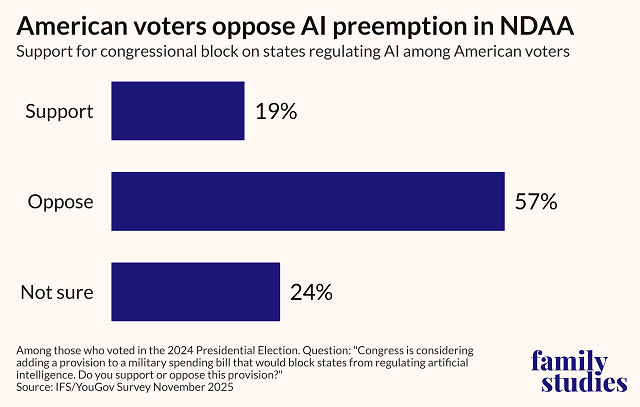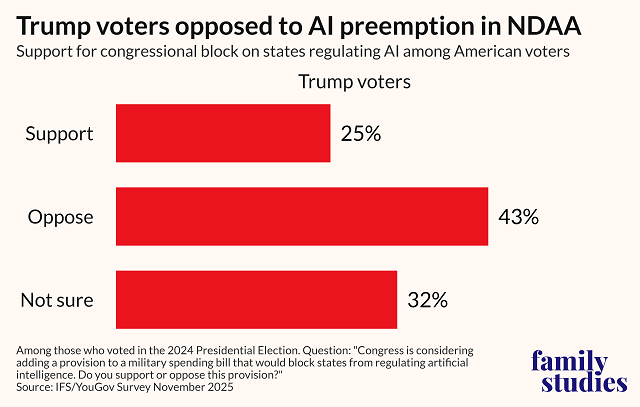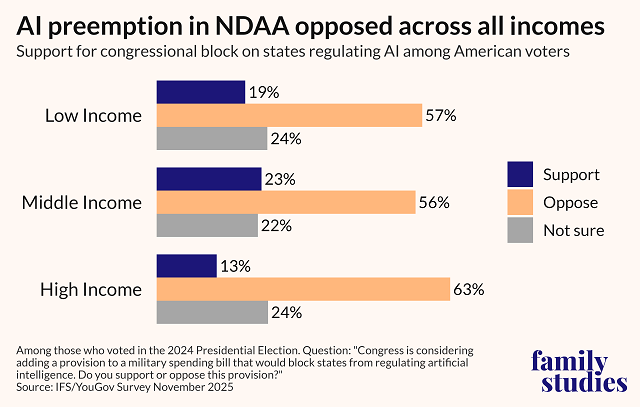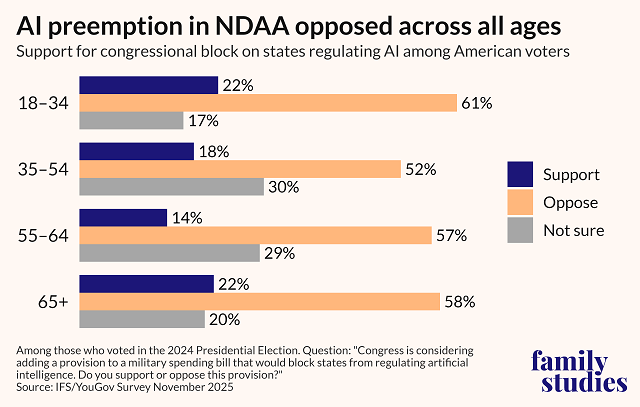Highlights
- New poll: Americans oppose adding AI preemption to the NDAA by a 3-to-1 margin. Majorities across parties, ages, and income levels reject blocking states from regulating AI. Why keep pushing an idea voters clearly don’t want? Post This
- Congress is again considering AI preemption in the NDAA—even after a 99–1 defeat in the Senate. But voters haven’t moved: they oppose federal preemption of state AI laws by a 3-to-1 margin. Bipartisan, broad, and consistent. Post This
- Americans like innovation—but not enough to let Washington block state AI safeguards. A new YouGov/IFS poll shows voters oppose adding AI preemption to the NDAA by a 3-to-1 margin, with majorities in every demographic group. Post This
Despite its overwhelming 99-1 defeat in the Senate this summer, a provision that would block and void state regulation of artificial intelligence (AI) is once again being considered by Congress.
This week, House Majority Leader Steve Scalise indicated interest in adding an AI preemption measure in the forthcoming National Defense Authorization Act (NDAA). Though no official language has been released and its inclusion in NDAA is far from certain, the push by a select number of Republicans for AI preemption suggests it isn’t going anywhere soon. Even the White House is backing the measure, as evidenced by an impending executive order that would, according to a leaked draft, direct federal agencies like the Department of Justice and Federal Trade Commission to “challenge state AI laws.”
In a new poll conducted in partnership with YouGov, the Institute for Family Studies asked American voters if they supported or opposed “Congress adding a provision to a military spending bill that would block states from regulating artificial intelligence."1 We wanted to know if the minds of voters have changed on this issue. Our hypothesis was no, but clearly some important Americans believe that preemption is good for America. Do the voters agree?
Findings
No, they do not agree. We found that 57% of Americans oppose Congress adding preemption to the NDAA, and only 19% support such a measure, with 24% being unsure. In other words, Americans oppose adding preemption to the NDAA by a 3-to-1 margin, and the unsure voters are still more numerous than the supporters.

Opposition to including the provision is—we once again found—bipartisan. 43% of Trump voters oppose this measure, compared with only 25% who support it. Supporters are outnumbered by the Trump voters who are unsure, at 32%. Across the aisle, a full 70% of Harris voters oppose this measure, while a mere 14% support it. Including preemption of state AI laws in the NDAA, in other words, remains unpopular with voters from both parties.

The measure, we also found, is unpopular across all incomes, with majorities in every income group opposing state preemption.

We broke down the sample into four age categories: 18 to 34, 35 to 54, 55 to 64, and 65+. A majority in every age group opposed the provision in the NDAA. Similar to our previous polling, the measure was most strongly opposed by younger voters, of whom 61% are against it, with a mere 22% supporting it. This opposition is noteworthy—of all age groups, younger Americans are the most acquainted with AI and most likely to use it.

In conjunction with two past surveys we conducted on AI preemption, this survey firmly establishes that blocking state-level AI regulation is widely unpopular with the American people. We are struck, once again, by the uniformity of this opposition: old and young, rich and poor, Republican and Democrat, Americans do not want Congress to preempt state AI regulation.
Conclusion
We have theorized in the past why voters oppose preemption so strongly, and our conclusion was that Americans like innovation, but do not like it enough to allow it to threaten the wellbeing of their families and communities.
But the more interesting question is why Congress and the White House—despite being already aware of the tremendous unpopularity of efforts to block states from regulating AI—keep pushing it. That is a much harder question to answer because we are not privy to the minds of those who are making policy decisions. But we, as people who have a lot of faith in democracy, think that policymakers should lean on the democratic process to find a coherent policy path forward by establishing bipartisan legislation that appeals to popular support.
Endnote:
1. This is IFS’s third poll on AI preemption. In our two previous polls, we found overwhelming opposition to this measure. In June, we found that Americans were opposed to the AI moratorium by a margin of 3-to-1. And in a September poll, we asked American voters what they wanted Congress to prioritize, passing laws to make AI chatbots safer for kids or passing legislation to advance and subsidize the AI industry, such as preemption. This latter poll found that voters wanted Congress to prioritize protecting kids over protecting industry by an incredible margin of 9 to 1.













